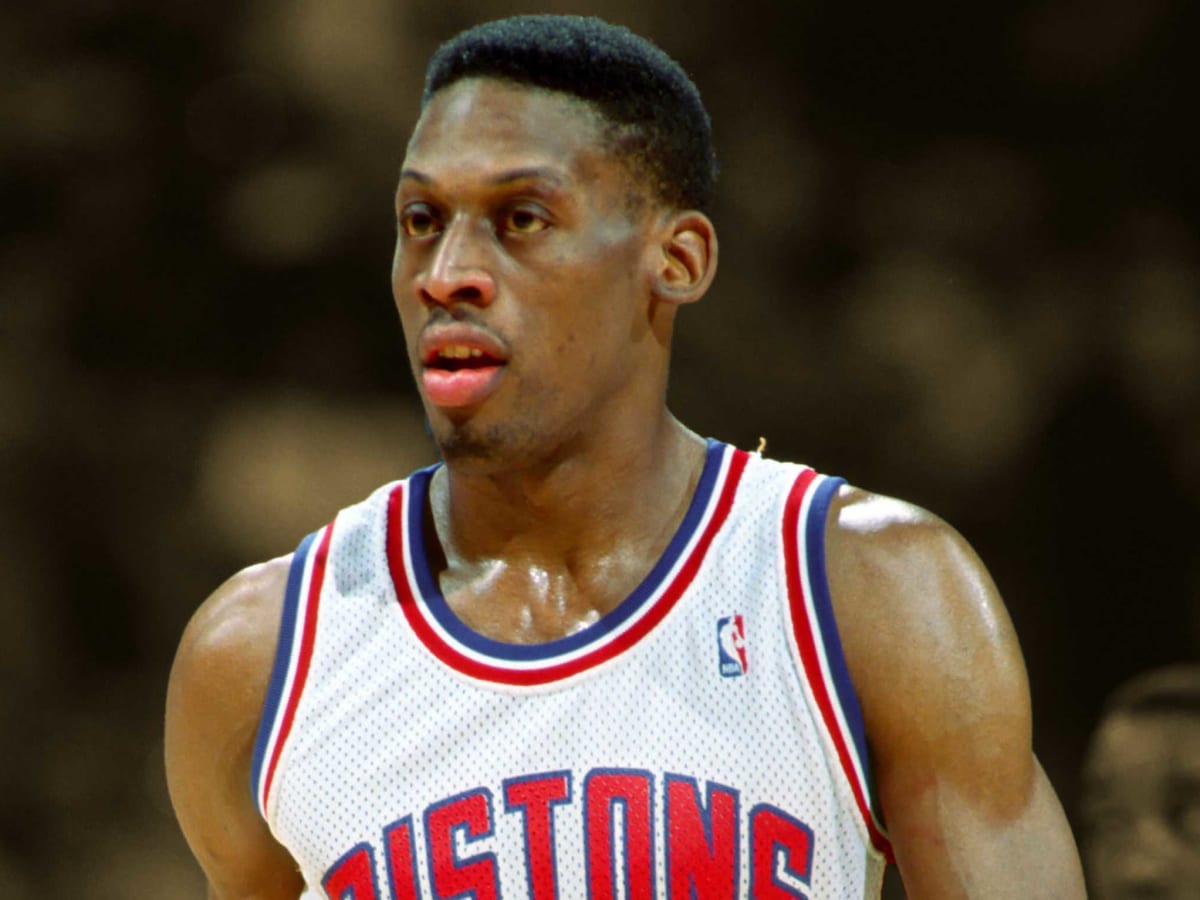Dennis Rodman Biography: Height, Children,Wife,Early Life, Age,Career

Dennis Rodman: The Rebounding King
Dennis Rodman is one of the most colorful, controversial, and unique players in the history of basketball. Known for his incredible rebounding ability, eccentric personality, and on-court intensity, Rodman’s journey to NBA stardom is unlike any other. Despite being considered undersized for a player of his position, Rodman became one of the most dominant players in the NBA, earning respect for his defense and relentless play. Over the years, Rodman has become a symbol of hard work, toughness, and individualism.
Early Life and Background
Dennis Keith Rodman was born on May 13, 1961, in Trenton, New Jersey, to Philander Rodman Jr., a military soldier, and Shirley Rodman, a homemaker. Rodman’s early life was filled with hardship. His father, who had a difficult relationship with him, left the family when Dennis was young, leaving him to be raised by his mother and sisters. Rodman grew up in a tough environment, and his early years were marked by instability.
He attended Jersey City High School, but struggled academically and in sports. However, by the time he transferred to Cooke County College in Texas, his love for basketball had started to develop. Standing at 6 feet 7 inches, he had the potential to play the game at a high level, but his journey to becoming an NBA player was not easy. He spent time at a local community college before transferring to Southeastern Oklahoma State University, where he played college basketball for the Southeastern Oklahoma State Savage Storm.
At Southeastern, Rodman began to show his potential on the basketball court. His natural ability to rebound, despite being shorter than many of his competitors, set him apart. By the time he finished his college career, he had become one of the best rebounders in the nation, catching the attention of NBA scouts.
NBA Career
Draft and Early Years with the Detroit Pistons
Rodman was selected by the Detroit Pistons in the 1986 NBA Draft with the 27th overall pick. At the time, his role on the team was not immediately clear. Known more for his defensive skills and his ability to rebound, Rodman was seen as a valuable role player rather than a star.
Under the leadership of coach Chuck Daly, Rodman became an integral part of the Detroit Pistons’ “Bad Boys” era. Known for their physical and aggressive play, the Pistons built their identity around toughness, and Rodman fit right in. He played a key role in the team’s defense, providing exceptional rebounding and making life difficult for opponents on both ends of the floor.
Rodman’s aggressive style earned him a reputation as one of the toughest players in the league, but it also made him a target for opponents and fans alike. His physical play, combined with his sometimes eccentric behavior off the court, made him a controversial figure in the NBA.
Rebounding Dominance and Championships with Detroit
Rodman quickly became one of the best rebounders in the NBA. His relentless pursuit of the ball, combined with his incredible jumping ability and positioning, made him a rebounding machine. By the late 1980s, Rodman was leading the league in rebounds, and his skills in that department became legendary.
In 1990, Rodman and the Pistons won the NBA Championship, defeating the Portland Trail Blazers. They repeated as champions in 1991, solidifying their place as one of the best teams of that era. However, despite the team’s success, Rodman’s eccentric personality began to clash with his teammates and coaches. This eventually led to his trade from Detroit.
The Chicago Bulls and Championship Success
In 1995, Rodman was traded to the Chicago Bulls, joining forces with Michael Jordan and Scottie Pippen. This marked the beginning of one of the most successful stretches of Rodman’s career.
With the Bulls, Rodman found a team that could accept his unique personality and his eccentricities, all while focusing on basketball. Rodman embraced his role as the team’s defensive and rebounding specialist, and his contributions were crucial to the Bulls’ success. He played a key role in the 1996, 1997, and 1998 NBA Championships, helping the Bulls win three consecutive titles and adding another layer to their already powerful dynasty. Rodman’s ability to rebound, his unmatched defensive intensity, and his willingness to do the dirty work on the court made him a perfect fit alongside Jordan and Pippen.
Rodman’s ability to rebound was so remarkable that he led the NBA in rebounds per game for seven consecutive seasons, earning him the nickname “The Rebounding King.” He became the first player in NBA history to average over 18 rebounds per game in a season, solidifying his place as one of the best rebounders to ever play the game.
The Los Angeles Lakers and Dallas Mavericks
After his time with the Bulls, Rodman had stints with the Los Angeles Lakers and the Dallas Mavericks. However, by this point in his career, Rodman’s play had begun to decline, and his controversial behavior off the court overshadowed his contributions on it. In 2000, Rodman played a short time with the Lakers, but he did not make a significant impact.
He finished his NBA career with the Dallas Mavericks in 2001, before retiring as one of the most decorated and polarizing players in NBA history.
Records and Achievements
Dennis Rodman’s list of achievements is a testament to his talent, resilience, and dedication to the game. Here are some of his key accomplishments:
- 5-time NBA Champion: Rodman won NBA titles with the Detroit Pistons (1990, 1991) and the Chicago Bulls (1996, 1997, 1998).
- 2-time NBA Defensive Player of the Year: He was named the league’s best defender twice (1990, 1991).
- 7-time NBA Rebounding Champion: Rodman led the league in rebounds per game for seven seasons.
- 14-time NBA All-Defensive Team selection: Rodman’s defense was legendary, and he was recognized as one of the best defenders in the league for much of his career.
- 5-time NBA All-Star: Rodman earned 5 All-Star selections during his career, highlighting his importance in the league.
- Inducted into the Naismith Memorial Basketball Hall of Fame: Rodman was inducted into the Hall of Fame in 2011, cementing his place as one of the all-time greats.
Rodman’s contributions on the court were mostly centered around defense and rebounding. He was never known for scoring, but his presence was felt in almost every other aspect of the game.
Personal Life and Legacy
Dennis Rodman’s life off the court was just as colorful as his basketball career. Known for his eccentric behavior, wild style, and bold personality, Rodman became a media sensation. His colorful hair, tattoos, and flamboyant fashion choices made him a polarizing figure, and he often embraced the attention that came with his antics.
Rodman was known for his relationships with celebrities and for his high-profile friendships, including his famous connection with North Korean leader Kim Jong-un, whom he met during several trips to North Korea. This friendship added to his already unique public persona.
Despite his off-court behavior, Rodman’s basketball legacy remains intact. He is regarded as one of the greatest rebounders and defenders to ever play the game, and his contributions to the Detroit Pistons’ and Chicago Bulls’ dynasties cannot be overstated.
Rodman’s life story is an example of a man who embraced his individuality and found success by staying true to who he was, even if it meant standing out from the crowd. His fearlessness on the court, combined with his unique personality off it, has made him a lasting figure in both the sports and pop culture worlds.
Conclusion
Dennis Rodman’s career is a reminder of how diverse and unpredictable the NBA can be. From his early struggles to his rise as one of the league’s most dominant defenders, Rodman’s story is one of perseverance, dedication, and individuality. Despite facing criticism and controversy throughout his career, Rodman’s impact on the game is undeniable.
His defensive brilliance and rebounding ability made him a key part of the Detroit Pistons and Chicago Bulls’ championships, and his legacy continues to inspire both current players and fans of the game.
Rodman may have been one of the most unconventional players in NBA history, but his contributions to the sport are undeniable, and his name will forever be remembered as one of basketball’s greatest personalities.



